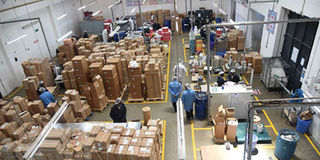Gazette rebate programme to boost industries

Skanem Interlabels factory in Nairobi on April 1, 2019. Energy cost and availability have always been central to industrial growth. PHOTO | DIANA NGILA | NATION MEDIA GROUP
What you need to know:
- To achieve any substantial and long-lasting economic impact for Kenya, we must position the issue of affordable and efficient use of energy at the centre of our development discourse.
- Kenya has had to have serious discussions on how to reduce the cost of energy to ensure that industry’s capacity to produce is boosted.
In history, energy innovations and the industrial revolutions have always intertwined.
Historian Robert Allen, in his 2009 account of the British Industrial revolution, credits the use of coal as a catalyst for the spouting of new innovations that brought about an industrial revolution in Britain.
The more efficient and affordable the use of coal, the more its uses increased and the more industry thrived.
Additionally, the more industry expanded, the more ways were conceived to increase the supply of energy and to improve the efficiency with which it was used. This is just one example of many.
Energy cost and availability have always been central to industrial growth and consequently, sustained economic development for many countries around the world.
PRODUCTIVITY
To achieve any substantial and long-lasting economic impact for Kenya, we must position the issue of affordable and efficient use of energy at the centre of our development discourse.
Critically, we must take concrete steps to ensure that there’s significant reduction of energy costs, and that these costs remain manageably low, for industry to be able to meet its function of employment creation and revenue generation for the country.
With our competitiveness as a country in the balance, Kenya has had to have serious discussions on how to reduce the cost of energy to ensure that industry’s capacity to produce is boosted.
Even if the production of energy has increased overall, as long as industry is not operating at full capacity (and costs remain high), it will not be consumed as it should and a lot of it will go to waste.
So, in the past two years, two main solutions have been proposed towards meeting these challenges: one being the Time of Use Tariff, and the second is the Electricity Cost Rebate Programme.
COST-SAVING
Time Of Use (TOU) tariff was launched to incentivise manufacturers to use more energy at their off-peak times, and for most, this translates to night time.
The uptake of the Time Of Use tariff has been on the increase on a monthly basis, with industry savings rising from Sh78.8 million in December 2017 to Sh196.7 million in December 2018.
An analysis of the top 17 TOU individual companies indicates that the highest firm beneficiary during the first 12 months saved a total of Sh52 million whereas the lowest saved Sh5.4 million.
On the other hand, the Electricity Rebate Programme was designed to significantly reduce the expenses on electricity by manufacturing companies, both large and small, by deducting the taxation on a percentage of their electricity bills.
This was done through the amendment of section 15 of the Income Tax Act in 2018, which ultimately provides that 30 per cent of electricity costs incurred by manufacturers will not be subjected to tax.
PROFIT
The intended impact of the rebate programme promises to be massive for local industry.
Its effective implementation will enhance the competitiveness of locally made products in the region. For instance, the electricity cost of producing a bag of cement is on average about 20 per cent of the overall cost of production.
With the rebate programme, the cost of the same bag will reduce by an approximate five per cent.
It is also projected that the impact on GDP will be immense, as the 30 per cent rebate will reduce the cost of doing business for manufacturers and therefore enhance their capacity to produce for local markets and grow exports.
This is why the industry now calls for the immediate gazettement of the rebate programme to enable it take effect.
Ms Wakiaga is the CEO, Kenya Association of Manufacturers. [email protected].





